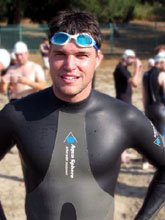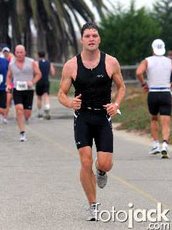 In his terrific book The New Rules of Lifting, exercise guru Lou Schuler quotes an old exercise adage:
In his terrific book The New Rules of Lifting, exercise guru Lou Schuler quotes an old exercise adage:1) Everything works -- and, the corollary,
2) Nothing works forever.
Think about all the testimonials you hear during infomercials from practitioners of, well, just about ANY Get-Fit-Fast system (doesn't everyone watch exercise infomercials?). They all sound remarkably alike: "I tried everything and nothing works like System X. I lost x pounds in y days and now I'm a size z! I'll never go back to any other system, ever!"
I'd like to hear from these people six months later. Only then would we get a good sense of the efficacy of System X.
I don't dispute those initial great results. What I do dispute is how long they last, and whether the rate of improvement that these people report is sustainable. My wager? Resoundingly, no, on both counts.
Bally's can smugly hire "trainers" whose only qualification is passing a 10-question True-False test because virtually anything they do to a new client -- short of inducing a heart attack on a treadmill -- will work. Put just about anyone who hasn't exercised in a long time on the most muddled, unsafe, inefficient and sloppily thought-out program, and you will get results-for a while. The body simply can't help but change, because it's adapting to all kinds of new stimuli. The first few weeks with a new client for me are always terribly flattering to me. I see their new muscles showing through the skin, watch their training weights soar, and decide I'm some kind of genius, when really all I've done is gently nudge them in the direction of a weight or two and try to keep them from breaking anything.
But my brilliance doesn't last, even with the most genetically-gifted client. That initial burst of fast progress slows down, plateaus, and possibly even reverses itself a bit.
 It doesn't matter if your fitness routine includes ambling for a half-mile a day or doing three-hour marathons every weekend, if you keep doing the same thing, so will your body. Like your mind, your body gets bored with repetition. It makes no more sense to do the same workout routine day after day than it does to read the same book over and over and expect your mind to stay engaged. Maybe it takes a month, two months or even six months, but that plateau descends. Sometimes that's when people quit, much to my dismay. If they don't, I rethink their program, they recommit to working out, and we both redouble our efforts to get them to their goals. Like life, it's a constant process of starting over, again and again. Set after set, workout after workout.
It doesn't matter if your fitness routine includes ambling for a half-mile a day or doing three-hour marathons every weekend, if you keep doing the same thing, so will your body. Like your mind, your body gets bored with repetition. It makes no more sense to do the same workout routine day after day than it does to read the same book over and over and expect your mind to stay engaged. Maybe it takes a month, two months or even six months, but that plateau descends. Sometimes that's when people quit, much to my dismay. If they don't, I rethink their program, they recommit to working out, and we both redouble our efforts to get them to their goals. Like life, it's a constant process of starting over, again and again. Set after set, workout after workout.So does all this mean you have to change things up ALL THE TIME? Never doing the same workout twice?
 Well, yes and no. The exact same workout -- i.e., the same running route, the same time of day, the same pace -- will eventually produce stagnation. But the variation that is required to cause change and improvement doesn't have to be enormous: there are enough possibilities with running alone, for example, to keep you occupied for a very long time. You can do long distances, short distances, trail running, intervals, tempo runs, recovery runs, just to name a few. You can work endurance, short-distance speed, running form, or any number of other aspects of your activity and still make improvements in fitness. Whenever the gym is closed, or a given piece of equipment that I'm particularly fond of is broken, or when Günter monopolizes the squat rack for the same hour I'm at the gym, I always grumble, but ultimately I make better progress because I'm forced to do something different -- something that inevitably is more novel, more stimulating, and usually more fun than the tried and true movement I'd planned. Necessity, mother, invention, and all that.
Well, yes and no. The exact same workout -- i.e., the same running route, the same time of day, the same pace -- will eventually produce stagnation. But the variation that is required to cause change and improvement doesn't have to be enormous: there are enough possibilities with running alone, for example, to keep you occupied for a very long time. You can do long distances, short distances, trail running, intervals, tempo runs, recovery runs, just to name a few. You can work endurance, short-distance speed, running form, or any number of other aspects of your activity and still make improvements in fitness. Whenever the gym is closed, or a given piece of equipment that I'm particularly fond of is broken, or when Günter monopolizes the squat rack for the same hour I'm at the gym, I always grumble, but ultimately I make better progress because I'm forced to do something different -- something that inevitably is more novel, more stimulating, and usually more fun than the tried and true movement I'd planned. Necessity, mother, invention, and all that. The good thing is that you can stay in the zone of first-blush fast-progress for an extended period by giving yourself permission to keep experimenting with the various aspects of your workout. Consistent exercisers often compare acquiring the habit of working out to brushing one's teeth or showering daily. I agree that putting aside the time should indeed be habitual, but what you do during that hour 3-6 days a week should NOT be a habit. Once you've acquired a good baseline of fitness, it can be an adventurous break from the rest of your day that's never the same one day to the next: maybe you'll check out that mountain bike trail you spied the other day on your morning commute. Maybe you'll try to break 1:10 swimming 100 meters at the pool. If you've got a couple of hours on the weekend, maybe you'll grab a friend and hike up a mountain.
The good thing is that you can stay in the zone of first-blush fast-progress for an extended period by giving yourself permission to keep experimenting with the various aspects of your workout. Consistent exercisers often compare acquiring the habit of working out to brushing one's teeth or showering daily. I agree that putting aside the time should indeed be habitual, but what you do during that hour 3-6 days a week should NOT be a habit. Once you've acquired a good baseline of fitness, it can be an adventurous break from the rest of your day that's never the same one day to the next: maybe you'll check out that mountain bike trail you spied the other day on your morning commute. Maybe you'll try to break 1:10 swimming 100 meters at the pool. If you've got a couple of hours on the weekend, maybe you'll grab a friend and hike up a mountain. Sure, it's nice to have your good old running route, your good old pec workout, your good old bike trail to come back to, but if you keep things interesting most of the time, it won't feel so much like drudgery when you come back to the old chestnut workouts. And even when you're doing the tried and true stuff, there's no reason you can't still switch it up: ratchet up the intensity or the duration on your aerobic session. Throw an extra ten pounds on the bar and see if you can lift it. Convince your running partner to help you try to shave 30 seconds off your three-mile running pace.
Sure, it's nice to have your good old running route, your good old pec workout, your good old bike trail to come back to, but if you keep things interesting most of the time, it won't feel so much like drudgery when you come back to the old chestnut workouts. And even when you're doing the tried and true stuff, there's no reason you can't still switch it up: ratchet up the intensity or the duration on your aerobic session. Throw an extra ten pounds on the bar and see if you can lift it. Convince your running partner to help you try to shave 30 seconds off your three-mile running pace.Millions of magazines are sold, gadgets shipped and fortunes made on the universal assumption that there's a Holy Grail of workouts that will deliver everything to everyone: six pack abs, firm muscles, lightning reflexes, catlike balance, marathon endurance, sprinter speed, yogic flexibility, and the most gleamingly healthy heart and lungs this side of Lance Armstrong. Let me save you some time and money here: that workout doesn't exist.
If you were to ask me what the best workout is, the one that will change your body, make you leaner, faster, stronger, and more youthful, in brief I'd invoke my bodybuilding brethren who say that the best workout is the one you haven't tried yet. So get out there and experiment!
Have a great week,
Andrew



